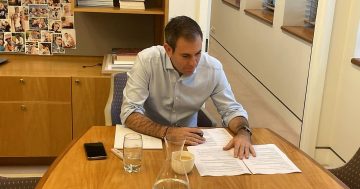
A new Aged Care Act heralds the largest reforms in the sector in 30 years. Photo: Supplied.
Roughly 1.4 million older Australians will be able to stay in their homes by 2035, due to a $5.6 billion investment reform package getting the approval of both major parties in the Federal Parliament.
The funding includes a $4.3 billion investment in Support at Home to come into effect on 1 July next year, and also provides new protections and stronger investigative powers for those who are in aged care.
But older Australians will have to contribute more to the cost of their care.
A deal to overhaul the aged care sector was reached between the Federal Government and the Opposition, following months of tense negotiations, with a new Aged Care Act to receive bipartisan support.
The Opposition had delayed the bill earlier in the week while negotiations continued.
The reforms, as agreed to, include new requirements for some elderly people to pay more for their own care.
The package responds to the recommendations of the Aged Care Taskforce, which brought together older Australians, experts and residential aged care providers and recommended that Australians make a reasonable means-tested contribution to the cost of their care.
A no worse off principle will apply for people already in aged care however, and there will be no change to the treatment of the family home.
The overall reform package represents the biggest shakeup to aged care in 30 years, with the net impact of the changes being a $930 million spend over four years and a $12.6 billion save over the next 11 years.
In announcing the reforms on Thursday (12 September), Prime Minister Anthony Albanese said “putting care back into aged care” was at the heart of his government’s move.
“Older Australians built this country, shaped our economy, did the hard yards. They embody the strength and the spirit of our nation,” the Prime Minister said.
“Our government is working to ensure that the aged care system that supports them is stronger now and sustainable into the future.
“Reforms like this do not happen every day. They are once-in-a-generation, and my government is proud to deliver them, as we said we would.
“I do want to thank the Opposition for their constructive engagement in this process.”
Treasurer Jim Chalmers said the reform package was a major initiative of the budget, which has the double-barrel result of caring for older Australians while also improving the government’s bottom line.
“This is how we budget for better care. This is how we fund the care Australians need and deserve as they age,” Dr Chalmers said.
“This is how we improve aged care and strengthen the budget at the same time.
“These reforms are all about delivering better care for more people in a more sustainable way.
“It’s a step change in care, and a structural reform to the budget.”
The Treasurer said the number of people in homecare had grown more than four times in just 10 years and would continue to rise.
Aged care spending will continue to grow at an average of 5.2 per cent over the next decade.
“It is a good thing that Australians are living longer and healthier lives and this is how we meet the rising costs of their care,” Dr Chalmers said.
“The government spending in aged care over that period is expected to double as a share of the economy and that makes it one of the fastest-growing areas of spending along with health, NDIS, Defence and interest costs on debt.”
The new Aged Care Act includes a Statement of Rights for older Australians in aged care, with a positive duty for providers to uphold those rights.
It includes new duties to hold providers and people in positions of leadership accountable, along with a compensation pathway.
New quality standards to drive continuous improvement and high quality care, are also provided for in the legislation.
Stronger regulatory powers to protect people from harm; new whistleblower protections; a regulator with stronger investigative powers; and a new, independent statutory Complaints Commissioner are all created with the new Act.
Aged Care Minister Anika Wells said the message from older Australians had been clearly delivered – that they want support to stay in the homes and communities they love.
“Support at Home will help around 1.4 million older Australians do just that, with shorter wait times, more levels of support, and funding for home modifications,” the Minister said.
“The government will pay 100 per cent of clinical care services, with people contributing towards their support services like help with showering, gardening or meal preparation.
“Older Australians will get support to spend their final weeks at home, surrounded by loved ones in an environment they cherish, instead of rushing precious moments into hospital visiting hours.”



















